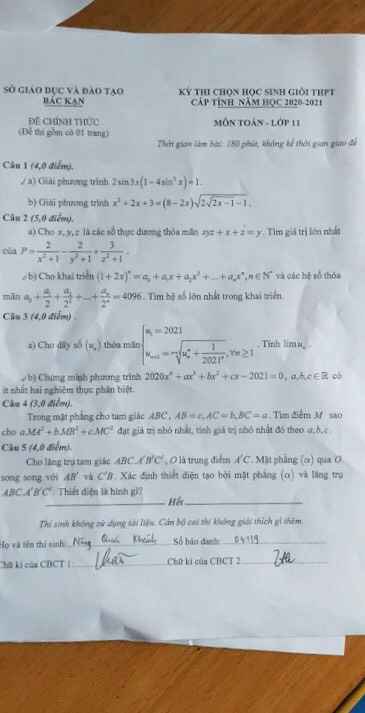
Hãy nhập câu hỏi của bạn vào đây, nếu là tài khoản VIP, bạn sẽ được ưu tiên trả lời.





S là tổng cấp số nhân vô hạn với \(\left\{{}\begin{matrix}u_1=1\\q=-\frac{1}{3}\end{matrix}\right.\)
Theo công thức ta có: \(S=\frac{u_1}{1-q}=\frac{1}{1-\left(-\frac{1}{3}\right)}=\frac{3}{4}\)


ĐKXĐ: \(\left\{{}\begin{matrix}x\ne\dfrac{\pi}{2}+k\pi\\x\ne-\dfrac{\pi}{4}+k\pi\end{matrix}\right.\)
\(\Leftrightarrow\dfrac{\left(1+2cos^2x-1+2sinx.cosx\right)cosx+cos^2x-sin^2x}{1+\dfrac{sinx}{cosx}}=cosx\)
\(\Leftrightarrow\dfrac{2cos^2x\left(sinx+cosx\right)+\left(sinx+cosx\right)\left(cosx-sinx\right)}{\dfrac{sinx+cosx}{cosx}}=cosx\)
\(\Leftrightarrow\dfrac{cosx\left(sinx+cosx\right)\left(2cos^2x+cosx-sinx\right)}{sinx+cosx}=cosx\)
\(\Rightarrow2cos^2x+cosx-sinx=1\)
\(\Rightarrow cosx-sinx-cos2x=0\)
\(\Rightarrow cosx-sinx-\left(cos^2x-sin^2x\right)=0\)
\(\Rightarrow cosx-sinx-\left(cosx-sinx\right)\left(cosx+sinx\right)=0\)
\(\Rightarrow\left(cosx-sinx\right)\left(1-sinx-cosx\right)=0\)
\(\Leftrightarrow\left[{}\begin{matrix}sinx=cosx\\sin\left(x+\dfrac{\pi}{4}\right)=\dfrac{\sqrt{2}}{2}\end{matrix}\right.\)
\(\Rightarrow\left[{}\begin{matrix}x=\dfrac{\pi}{4}+k\pi\\x=k2\pi\\x=\dfrac{\pi}{2}+k2\pi\end{matrix}\right.\) \(\Rightarrow x=\dfrac{\pi}{4}\)
Có 1 nghiệm trên khoảng đã cho
 câu 1 đến câu 3 nha
câu 1 đến câu 3 nha
\(3+1=4\)
3+1 = 4
Học tốt
#Shino